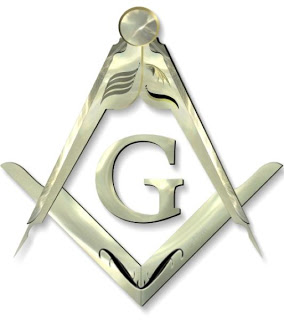
On an official photograph of himself with his father, the Prince inscribed: "To Robert and Piers, Best wishes and long life to M-Base. Albert." Eringer hung it above the conference table.
During a two-hour session, Eringer covered a number of topics, commencing with the Prince's purported pet peeve: Masonic lodges.
Freemasons play an important role in French judicial and law enforcement professions compared to other countries, where membership and especially influence of Masonic movements have been in decline. French Freemason Lodge membership is a virtual Who's Who of France.
There are three Freemason lodges in France: Grande Loge Nationale Francaise (GLNF), Grande Loge de Francaise (GLF), and Grand Orient de Francaise (GO).
Eringer determined that the lodge the Prince had been invited to join was GLF. Both GLF and GO operate in southern France and have been corrupt for decades, the latter believed to have been completely overtaken by organized crime.
Only GLNF is associated with the Great United Lodge of Great Britain; the other two considered "irregular."
GLNF concentrated on philosophical matters while GLF and GO with social matters, though all gained reputations for being "affairiste" i.e. becoming involved with corrupt business practices.
But it was particularly in the south (GO and GLF) where influence trafficking, false invoicing, creation of fictitious employees and similar matters had been rife, particularly in companies controlled by the state or provinces. Freemasons then hampered investigations by the judiciary, which they heavily penetrated (especially GLNF in Nice).
France's external intelligence service (DGSE) favored GLNF while domestic security services (DST and RG) gravitated to GO and GLF.
These groups had at their disposal a number of bureaucratic measures they could take to torpedo any serious attempt at reform: "Routine" inspections, internal investigations, and reassignments. Further, these measures taken at the local or regional level were often supported or generated at the Paris level by Freemasons in positions of great importance.
A report from one extremely good source concluded thus:
Many of the Prince's friends are undoubtedly already Freemasons in one of the three major lodges. The trust-worthiest of those friends needs to be encouraged to provide him or his designate with confidential information. It is difficult to infiltrate these lodges through new recruits because it generally takes years before they rise to inner circle levels, which is where you need to be to find out what is really going on. Your project is a daunting one.
Not so daunting for Eringer, as he quickly identified one such trustworthy friend who placed his loyalty to the Prince above Masonic vows. He revealed to Eringer that GLF had been active in Monaco during the 1960s, 1970s, and 1980s, but that its influence waned upon the death of its founder, Mr. Henri Die, in 1990.
These Freemasons, who gathered at Henri Die's home-Les Villas Bleues, 5 rue de l'Abbaye, Monaco-included Victor Pastor, Michel Pastor, and Raoul Biancheri, brother of Raymond Biancheri, Prince Rainier's long-serving chief of staff.
After Henri Die's death, Raoul Biancheri re-launched GLF, but its influence dissipated after Gaston Carrasco, his staunch Masonic right-hand man, left his job as Monaco's chief public prosecutor.
With regard to the Freemason situation at the time of this briefing, Eringer gleaned information from the Prince's trustworthy friend:
* A Masonic lodge linked to the Grand Lodge of Britain gathered once a month at St. Paul's Anglican Church in Monte Carlo. Most of its members were Anglo-Saxon Monaco residents who did not involve themselves in local political and social life.
* Monegasque Freemasons did not meet in Monaco but belonged to lodges located in France, particularly in Beausoleil, Menton, Nice, and Cannes.
Eringer made two recommendations:
1) To curtail Freemason influence (that is, promotion based on membership rather than merit within Monaco's police force and judiciary), one should follow Great Britain's example and create legislation that obligates all new police recruits to declare alliances to any fraternal orders or secret societies. Transparency would result.
2) Quash any attempt to create a Masonic lodge within the principality.
Coming Next: Operation Hound Dog